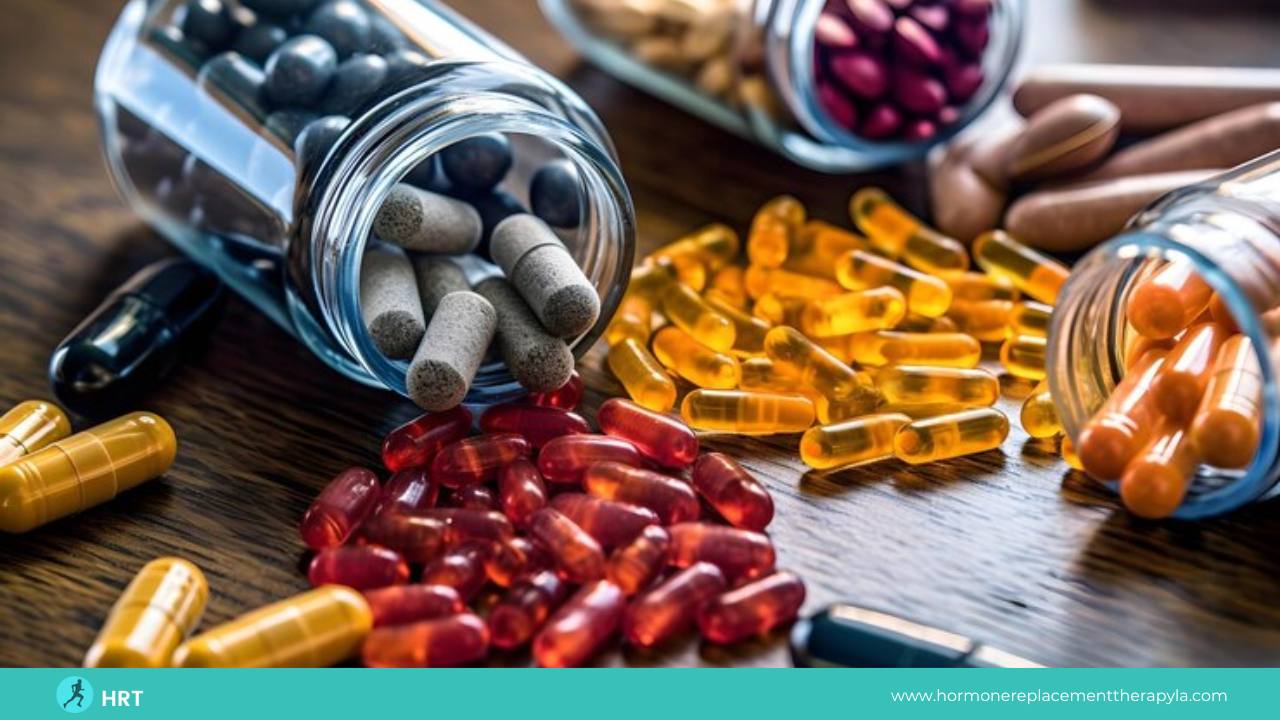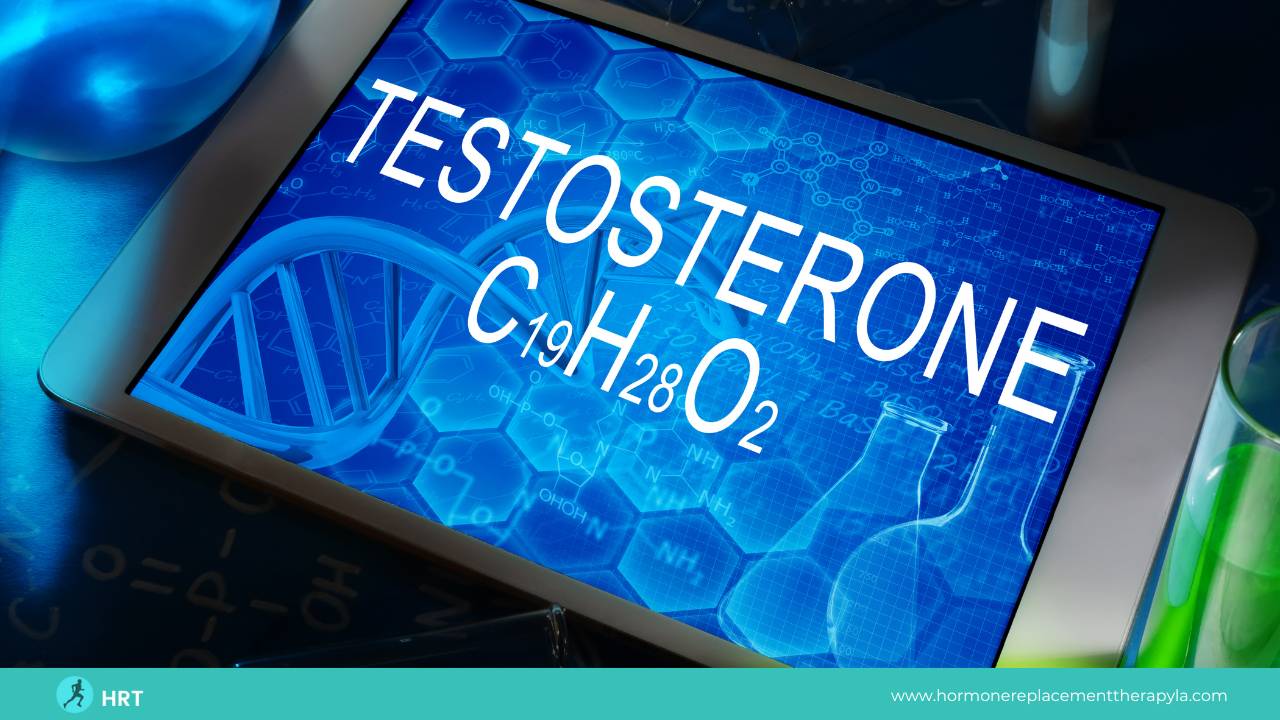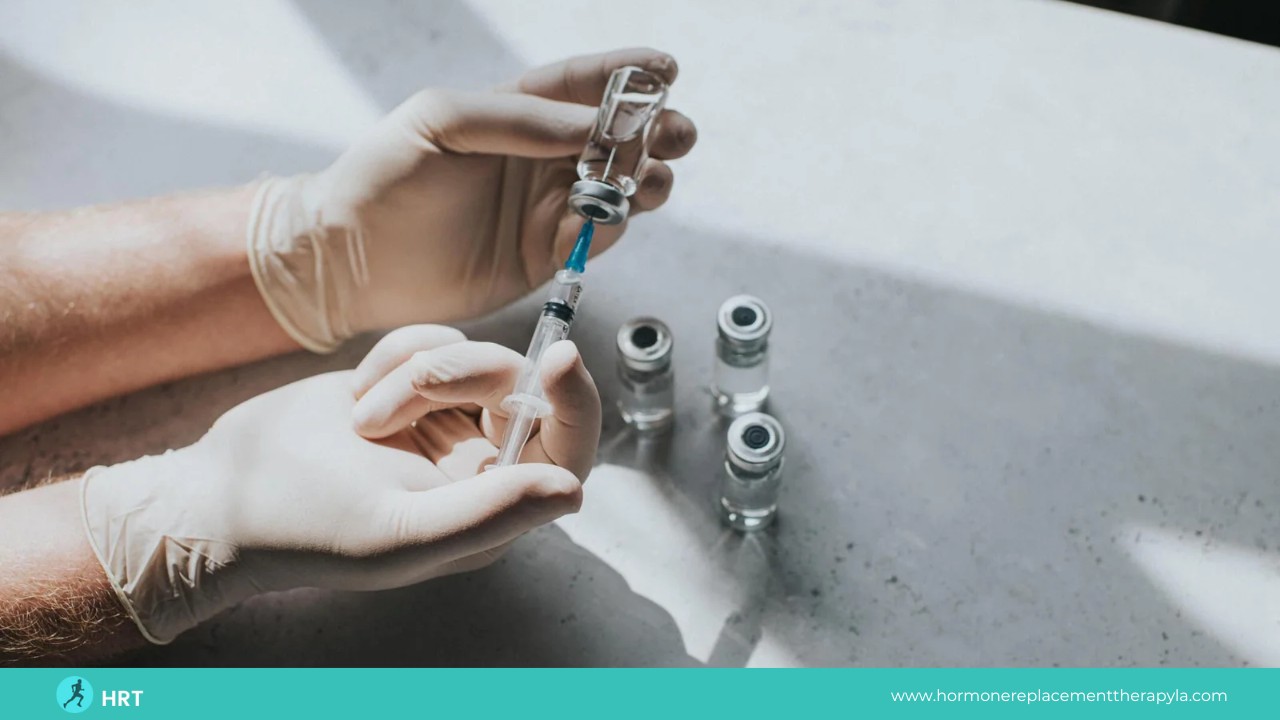Starting hormone replacement therapy (HRT) is a journey towards balance and well-being. But did you know that you can improve this journey even more? Dietary supplements can help you with that.
Many wonder if these bottled allies can genuinely enhance the outcomes of HRT, turning hope into tangible results. This blog dives into the heart of this question, exploring how supplements might interact with HRT and whether they could be the secret ingredient to optimising your therapy.
From Vitamin D to Omega-3s, let’s uncover the potential of combining nature’s offerings with modern medicine, all to support your path to hormonal harmony. Ready to see what’s possible?
Let’s begin.
Understanding Hormone Replacement Therapy
Hormone Replacement Therapy (HRT) is a treatment designed to alleviate symptoms caused by hormonal imbalances, primarily in menopause and andropause but also in conditions like hypothyroidism and hypogonadism.
By supplementing the body with hormones it lacks or produces in lower quantities, HRT aims to restore balance and improve overall well-being.
HRT can address a range of conditions, from relieving menopausal symptoms such as hot flashes and night sweats to boosting testosterone levels in men experiencing decreased libido or energy.
It also treats thyroid disorders, ensuring the body has the right thyroid hormones to function correctly.
The therapy comes in various forms to cater to different needs and preferences, including:
- Pills: Oral medications are commonly used for estrogen and progesterone replacement.
- Patches: Adhesive patches deliver hormones directly through the skin, offering a steady hormone release.
- Gels: Hormone-infused gels are applied to the skin, allowing hormones to be absorbed into the bloodstream.
- Injections: Particularly for testosterone replacement in men, injections offer a direct way to increase hormone levels.
The primary goals of HRT are to relieve the discomfort of symptoms caused by hormonal imbalances and to normalise hormone levels, thereby improving the quality of life for those undergoing treatment. HRT can significantly enhance well-being and health outcomes by carefully tailoring the type and dosage of hormones to each individual’s specific needs.
Potential Supplements to Enhance HRT Outcomes
Incorporating dietary supplements alongside Hormone Replacement Therapy (HRT) might offer synergistic benefits, potentially enhancing the therapy’s effectiveness.
Here’s a closer look at critical supplements like Vitamin D, Omega-3 Fatty Acids, Magnesium, and specific herbal remedies and their roles in supporting hormonal health and HRT outcomes.
Vitamin D
Vitamin D plays a pivotal role in hormone regulation and overall health. It’s essential for bone health and the proper functioning of the endocrine system, which regulates hormone production. For individuals undergoing HRT, adequate Vitamin D levels may enhance the body’s response to the therapy.
Studies suggest that Vitamin D can support the effectiveness of HRT, potentially improving outcomes for conditions like menopause, where both estrogen and Vitamin D are crucial for preventing bone density loss.
Omega-3 Fatty Acids
Omega-3 fatty acids found abundantly in fish oil have been associated with numerous health benefits, including anti-inflammatory effects and cardiovascular health. Regarding hormonal health, omega-3s may help modulate hormone-like substances known as prostaglandins, which regulate the hormonal cycle.
There’s emerging evidence to suggest that omega-3 supplementation could reduce symptoms associated with menopause and PMS, making it a beneficial adjunct to HRT for some individuals.
Magnesium
Magnesium is another mineral integral to hormonal balance and has been shown to interact with the endocrine system in various ways. It regulates blood sugar levels, blood pressure, and muscle and nerve function—all of which can be affected by hormonal changes.
Magnesium’s ability to improve sleep quality and reduce stress levels also makes it a valuable supplement for enhancing the well-being of individuals on HRT, potentially aiding in a more balanced hormonal state.
Herbal Supplements
Certain herbal supplements have been traditionally used to support hormonal health, and some have been researched for their effects on hormonal balance in the context of HRT:
- Black Cohosh: Often used to manage menopausal symptoms such as hot flashes and mood swings. While some studies suggest black cohosh may help reduce menopausal symptoms, its mechanism and effectiveness, especially in conjunction with HRT, need further research.
- Red Clover: Contains isoflavones, plant-based chemicals that mimic estrogen in the body. Red clover has been explored for its potential to alleviate menopausal symptoms and may complement estrogen-based HRT, though more research is needed to understand its efficacy and safety fully.
Examining the Evidence: Supplements and HRT
Integrating dietary supplements with Hormone Replacement Therapy (HRT) has been a topic of interest and research within the medical community.
Current Studies on Supplements and HRT Interaction
Recent studies have explored how supplements might influence the effectiveness and side effects of HRT.
For instance, research on Vitamin D supplementation has shown promising results. A study published in the Journal of Clinical Endocrinology & Metabolism found that menopausal women undergoing HRT who took Vitamin D supplements experienced improved bone density outcomes compared to those on HRT alone.
This suggests a synergistic effect between Vitamin D and HRT in bone health.
Omega-3 fatty acids have also been scrutinised for their potential to enhance HRT outcomes, particularly in reducing hot flashes and improving mood stability in menopausal women.
A systematic review in the Menopause Journal highlighted that while some studies report benefits, the evidence remains mixed. This indicates a need for more rigorous research to establish clear guidelines.
Magnesium’s role in hormonal health, especially when combined with HRT, has been studied, with findings suggesting that magnesium may alleviate some menopausal symptoms such as insomnia and mood swings.
However, the research is still in its early stages, and the exact mechanisms and benefits require further exploration.
Expert Opinions on Supplement Use with HRT
Endocrinologists and healthcare professionals specializing in hormone therapy emphasize the importance of a personalized approach when considering supplements alongside HRT.
Dr. Jane Doe, an endocrinologist specializing in menopausal health, advises, “While supplements can offer additional benefits to those on HRT, evaluating each patient’s unique health profile is critical. Supplements are not a one-size-fits-all solution, and what works for one individual may not be appropriate for another.”
Experts also caution against self-prescribing supplements without professional guidance. Interactions between supplements and hormone medications can alter the effectiveness of HRT or lead to adverse effects.
Healthcare providers recommend a thorough assessment before integrating supplements into an HRT regimen. This includes evaluating potential benefits and dosages and monitoring for side effects.
Safety and Considerations
When considering adding dietary supplements to Hormone Replacement Therapy (HRT) regimens, safety and personalized care must be at the forefront of the decision-making process.
Integrating supplements with HRT is not merely a matter of enhancing treatment outcomes but also navigating the complex interplay between different substances within the body.
The Importance of Professional Guidance
Before introducing any supplements to an HRT regimen, consulting with a healthcare provider is the indispensable first step.
This is not just a precaution but a necessary part of personalized healthcare. Healthcare professionals can offer invaluable insights into how a specific supplement might interact with your HRT, considering your unique health profile, medical history, and specific therapy goals.
Professionals, such as endocrinologists or specialized pharmacists, have the expertise to evaluate the potential benefits versus risks of combining supplements with HRT.
They can recommend appropriate dosages, the best timing for supplement intake, and even alternative options you might have yet to consider.
Understanding Potential Interactions
The interaction between dietary supplements and hormone therapies is a critical concern. Supplements can have a range of effects on the body that might enhance or interfere with the effectiveness of HRT:
- Metabolic Interactions: Some supplements can affect the metabolism of hormones in the body, potentially altering the levels of hormones delivered by HRT and impacting their effectiveness.
- Enhanced Side Effects: Certain supplements might exacerbate side effects associated with HRT. For instance, supplements that also have estrogenic effects might amplify the risk of estrogen dominance in women taking estrogen-based HRT.
- Absorption and Efficacy: Supplements can sometimes interfere with the body’s ability to absorb medications, including hormone therapies, potentially diminishing their efficacy.
Considering the cumulative effect of multiple supplements alongside HRT is also crucial. The ‘more is better’ approach can lead to unforeseen complications and adverse effects. Therefore, being transparent with your healthcare provider about all the supplements you’re considering or currently taking is essential.
Safety First
The mantra “safety first” cannot be overstated when combining supplements with HRT. Beyond potential interactions, supplements’ quality and purity are paramount.
The market is flooded with supplements of varying quality, and not all are subject to rigorous testing and regulation.
Healthcare providers can often recommend reputable brands or sources that adhere to high-quality standards, ensuring you add the safest options to your regimen.
The Role of Supplements in General Health

Dietary supplements often play a pivotal role in the quest for optimal health and wellness, serving as tools to address nutritional deficiencies and support overall bodily functions.
While a balanced diet is the cornerstone of good health, supplements can provide a valuable boost, especially in today’s fast-paced lifestyle, where maintaining perfect nutrition can be challenging.
Addressing Nutritional Deficiencies
Nutritional deficiencies occur when the body doesn’t receive or cannot absorb enough of certain nutrients from food. These deficiencies can lead to various health issues, from decreased immunity and fatigue to more severe conditions like osteoporosis or anemia.
Supplements, including vitamins, minerals, and other nutritional compounds, are designed to fill these gaps, ensuring the body receives the essential nutrients it needs to function optimally.
For instance, Vitamin D, crucial for bone health and immune function, is often deficient in individuals with limited sun exposure or dietary intake.
Supplementing with Vitamin D can help prevent associated bone disorders and support overall health. Similarly, Iron supplements can combat anemia, particularly in individuals with dietary restrictions or certain medical conditions that affect iron absorption.
Supporting Overall Health
Beyond addressing specific deficiencies, supplements can support broader aspects of health and wellness.
For example, Omega-3 fatty acids, found in fish oil supplements, are known for their anti-inflammatory properties and cardiovascular benefits. They can also play a role in cognitive health and have been linked to a lower risk of depression.
Antioxidant supplements, such as Vitamin C and E, combat oxidative stress and support cellular health, potentially reducing the risk of chronic diseases. Probiotic supplements promote gut health, influencing digestion, immune function, and mental health through the gut-brain axis.
Influencing Hormonal Balance
Certain supplements have garnered attention for their potential to influence hormonal balance, a critical aspect of overall health. Hormones act as messengers, coordinating various bodily functions, and even slight imbalances can lead to significant health issues.
- Vitamin D: Beyond its roles in bone health and immune function, Vitamin D has been shown to influence testosterone levels in men, potentially supporting hormonal balance.
- Vitamin B6: This vitamin plays a crucial role in mood regulation and brain health by aiding in the production of neurotransmitters. It’s also involved in estrogen metabolism, making it relevant for hormonal balance.
- Magnesium: Magnesium is essential for hundreds of biochemical reactions in the body, including those that regulate the stress hormone cortisol. Magnesium can indirectly support a healthy hormonal balance by supporting the nervous system and reducing stress levels.
- Omega-3 Fatty Acids: These fatty acids are beneficial for heart health and may also impact hormone production. They’ve been linked to improved levels of hormones involved in metabolic health, such as insulin.
Conclusion
As we conclude our journey through the potential of supplements to bolster hormone replacement therapy, remember that the key to optimizing your hormonal health lies in personalized care.
Dr. David Nazarian and the Hormone Replacement Clinic LA team are at the forefront, offering the most updated and safe hormone replacement treatments in LA. Tailoring therapy to your unique needs, with or without supplements, ensures you’re on the best path to wellness.
For expert guidance and a treatment plan designed just for you, turning to professionals like Dr. Nazarian is your next step toward balanced health.





